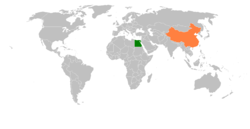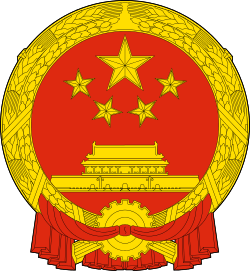China–Egypt relations
 |
|
Egypt |
China |
|---|---|
People's Republic of China – Egypt relations were established on May 30, 1956.[1] Chinese Premier Zhou Enlai visited Egypt three times during his tenure,[1] and President Hosni Mubarak has visited China several times.[1] Egypt's first democratically elected president, Mohamed Morsi also flew to China on an official visit.
History
Fatimid Caliph Al-Hakim bi-Amr Allah sent a delegation to Song dynasty China led by Domiyat.
Yusuf Ma Dexin visited Egypt.
The Republic of China (1912–49) sent Hui Muslims like Muhammad Ma Jian and other Hui Muslim students to study at Al-Azhar in Egypt.[2] The Fuad Muslim Library in China was named after Fuad I of Egypt by the Chinese Muslim Ma Songting.[3]
Imam Wang Jingzhai studied at Al-Azhar University in Egypt along with several other Chinese Muslim students, the first Chinese students in modern times to study in the Middle East.[4] Wang recalled his experience teaching at madrassas in the provinces of Henan (Yu), Hebei (Ji), and Shandong (Lu) which were outside of the traditional stronghold of Muslim education in northwest China, and where the living conditions were poorer and the students had a much tougher time than the northwestern students.[5] In 1931 China sent five students to study at Al-Azhar in Egypt, among them was Muhammad Ma Jian and they were the first Chinese to study at Al-Azhar.[6][7][8][9] Na Zhong, a descendant of Nasr al-Din (Yunnan) was another one of the students sent to Al-Azhar in 1931, along with Zhang Ziren, Ma Jian, and Lin Zhongming.[10]
A Hadith(圣训),(It is not a real Hadith but was a popular slogan among Arabic speakers in Middle East in the 19th-20th centuries. It spread to China via Hui Muslim students like Muhammad Ma Jian who studied at Al-Azhar in Egypt) a saying of the prophet Muhammad, spread to China, which says "Loving the Motherland is equivalent to loving the Faith" (traditional Chinese: 愛護祖國是屬於信仰的一部份; simplified Chinese: 爱护祖国是属于信仰的一部份; pinyin: àihù zǔguó shì shǔyú xìnyǎng de yī bùfèn) (Arabic: حب الوطن من الایمان ḥubb al-waṭan min al-imān).[11]
Hui Muslim General Ma Bufang and his retinue including Ma Chengxiang moved to Egypt before being appointed as ambassador to Saudi Arabia.
Bilateral trade
Bilateral trade reached about $4 billion U.S. dollars in 2007, up from $3.19b in 2006.[12] In 2010, it was worth US$7.0 billion.[13] In 2011 Egypt was the 5th largest trading partner of China in Africa and in the first 8 months of 2012 it was the 4th.[14]
Chinese development finance to Egypt
From 2000 to 2012, there are approximately 39 Chinese official development finance projects identified in Egypt through various media reports.[15] These projects range from jointly constructing an industrial park in the Northwest Suez Economic Zone beginning June 1, 2000,[16] to the construction of a Chinese language school in Cairo in 2002 through a 4 million USD grant from the Chinese government.[17] In 2014, Egyptian president Elsisi made a visit to China and signed a number of deals there.
Bibliography
- Cardenal, Juan Pablo; Araújo, Heriberto (2011). La silenciosa conquista china (in Spanish). Barcelona: Crítica. pp. 33–40.
References
- 1 2 3 "China-Egypt Relations". Chinese Foreign Ministry. January 18, 2004. Retrieved 2010-06-13.
- ↑ Kees Versteegh; Mushira Eid (2005). Encyclopedia of Arabic Language and Linguistics: A-Ed. Brill. pp. 382–. ISBN 978-90-04-14473-6.
- ↑ Stéphane A. Dudoignon, Hisao Komatsu, Yasushi Kosugi (2006). Stéphane A. Dudoignon, Hisao Komatsu, Yasushi Kosugi, eds. Intellectuals in the Modern Islamic World: Transmission, Transformation, Communication. Taylor & Francis. p. 251. ISBN 978-0-415-36835-3. Retrieved 28 June 2010.
- ↑ ed. Kurzman 2002, p. 368.
- ↑ ed. Kurzman 2002, p. 373.
- ↑ "China Magazine, Volumes 6-7" 1941, p. 21.
- ↑ "China at War, Volume 6" 1941, p. 21.
- ↑ "Asia and the Americas, Volume 42, Issues 1-6" 1942, p. 21.
- ↑ "Asia, Volume 42" 1942, p. 21.
- ↑ 编导:韩玲 (Director: Han Ling) 摄像:李斌 (Photography: Li Bin) (央视国际 (CCTV international)). 2005年02月24日 16:22.
- ↑ Stéphane A. Dudoignon; Hisao Komatsu; Yasushi Kosugi (2006). Intellectuals in the modern Islamic world: transmission, transformation, communication. Taylor & Francis. p. 279. ISBN 978-0-415-36835-3. Retrieved 2010-06-28.
- ↑ "Chinese ambassador highlights China-Egypt relations". Ministry of Foreign Affairs, the People's Republic of China. 2007-10-29. Retrieved 2010-06-13.
- ↑ "China pledges $20bn in credit for Africa at summit". BBC News Online. BBC. 2012-07-19. Retrieved 2012-07-19.
- ↑ "Mozambique-China Trade Continues to Grow". allafrica.com. 2012-12-09. Retrieved 2012-12-09.
- ↑ Austin Strange, Bradley C. Parks, Michael J. Tierney, Andreas Fuchs, Axel Dreher, and Vijaya Ramachandran. 2013. China’s Development Finance to Africa: A Media-Based Approach to Data Collection. CGD Working Paper 323. Washington DC: Center for Global Development.http://china.aiddata.org
- ↑ Strange, Parks, Tierney, Fuchs, Dreher, and Ramachandran, China’s Development Finance to Africa: A Media-Based Approach to Data Collection.http://aiddatachina.org/projects/440
- ↑ Strange, Parks, Tierney, Fuchs, Dreher, and Ramachandran, China’s Development Finance to Africa: A Media-Based Approach to Data Collection.http://aiddatachina.org/projects/468

.svg.png)